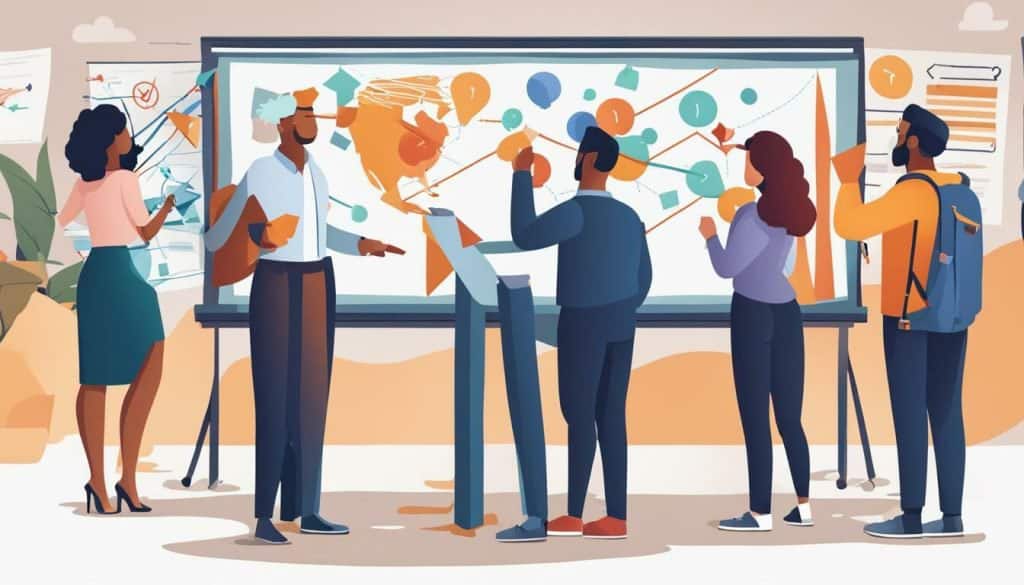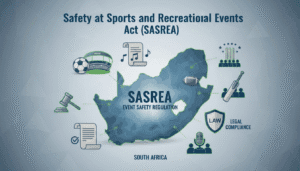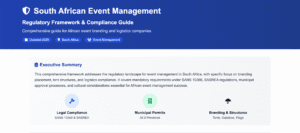Conducting follow-ups after corporate events is crucial for strengthening relationships, gathering valuable feedback, and maximizing event ROI. In South Africa, post-event engagement and feedback collection are essential strategies for enhancing your business network and driving future event success. By implementing effective follow-up practices, you can leave a lasting impression and build strong relationships with guests, speakers, sponsors, and vendors.
After every corporate event, it is important to show appreciation and thank everyone involved. Sending personalized thank yous, whether through individual cards or emails, demonstrates your gratitude and reinforces the connection made during the event. In addition, hosting a post-event review or debrief session with your team and volunteers allows for an evaluation of the event’s success and provides valuable insights for improvement.
Gathering feedback from attendees, sponsors, and speakers is crucial for planning and executing future events more effectively. Utilizing event attendee surveys, engaging in informal conversations, and collecting feedback forms can provide valuable insights and help identify areas for improvement.
Maximizing your event’s online reach is key to creating buzz and building an audience for future events. Engaging on social media platforms by following event-related conversations, thanking guests for their participation, and sharing event highlights can generate excitement and keep attendees engaged even after the event has ended.
Collecting visual media, such as photos and videos, allows you to capture the memorable moments of the event. These visuals can be used to create marketing materials and highlight reels, showcasing the event’s best moments and promoting future events.
Hosting an after-party is a great way to show appreciation for your team, volunteers, and service providers. It provides an opportunity to celebrate the success of the event in a more relaxed environment and further strengthens relationships.
Sending out personalized swag or relevant items to key individuals involved in the corporate event is another way to strengthen relationships and reinforce your brand messaging. This gesture shows appreciation and leaves a lasting impression.
Crafting memorable and personalized follow-up emails is crucial for building upon the connections made during the event. These emails should have a clear purpose, be concise and straightforward, and include a compelling call to action. Follow-up emails are an opportunity to nurture potential clients, partners, or collaborators and move the relationship forward.
In conclusion, conducting follow-ups after corporate events in South Africa is essential for building and strengthening relationships, gathering valuable feedback, and driving future event success. By implementing effective event follow-up strategies, such as personalized thank yous, post-event engagement, and feedback collection, you can enhance your business network and maximize the ROI of your events.
Key Takeaways:
- Conducting follow-ups after corporate events is crucial for strengthening relationships and gathering valuable feedback.
- Thanking everyone involved, including guests, speakers, sponsors, vendors, and the core team and volunteers, is important for leaving a lasting impression.
- Hosting a post-event review or debrief session allows for evaluating the event’s success and identifying areas of improvement.
- Collecting feedback from attendees, sponsors, and speakers provides insights for planning and executing future events more effectively.
- Engaging on social media by following event-related conversations and sharing highlights helps generate buzz and build an audience for future events.
Thanking Everyone Involved
After the event, it is important to express gratitude and acknowledge the contributions of everyone involved. Taking the time to thank guests, speakers, sponsors, vendors, and the core team and volunteers not only shows appreciation, but also helps to build and strengthen relationships. Personalized thank yous go a long way in leaving a lasting impression on individuals, making them feel valued and appreciated.
“Gratitude can transform common days into thanksgivings, turn routine jobs into joy, and change ordinary opportunities into blessings.” – William Arthur Ward
A simple gesture of sending individual thank you cards or emails can make a significant impact. Personalization is key here, as it shows that you have taken the time and effort to acknowledge each person’s specific contribution. By expressing your appreciation, you contribute to building a positive working relationship, which can be beneficial for future collaborations and partnerships.
Post-Event Communication
In addition to personalized thank yous, effective post-event communication is crucial for maintaining and nurturing relationships. Timely and clear communication helps to keep the momentum going and allows for continued engagement.
Consider sending out a post-event email to all attendees, summarizing the highlights and key takeaways from the event. This not only provides a recap for those who attended, but also creates a sense of inclusion for those who were unable to attend. It is an opportunity to share any important updates or upcoming events, keeping everyone informed and engaged with your organization.
Remember to include a clear call to action in your post-event communication. This could be directing recipients to a feedback form, inviting them to follow your social media accounts, or offering a special discount or promotion for future events. The goal is to keep the conversation going and encourage continued engagement from your audience.
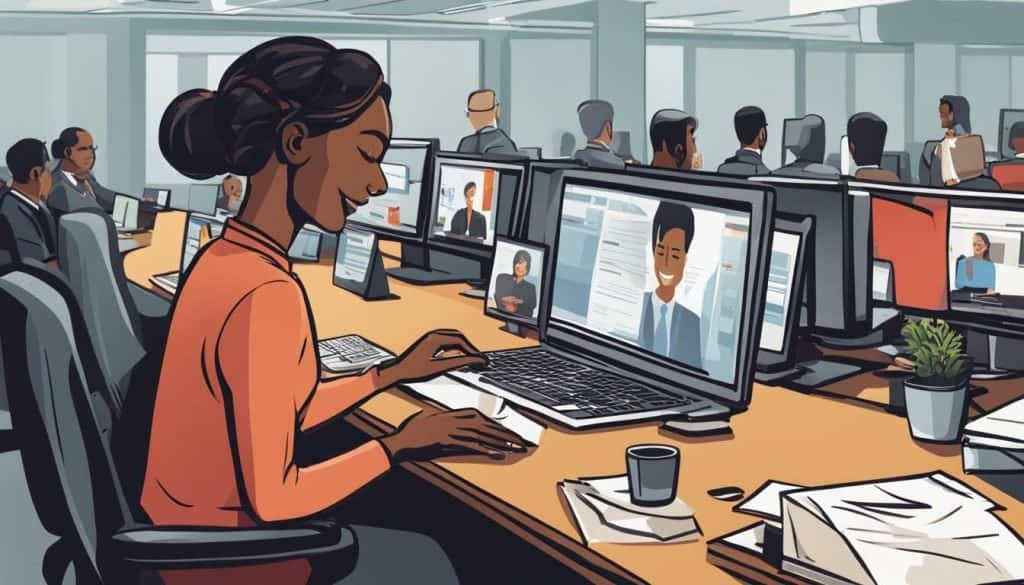
By expressing gratitude and maintaining effective post-event communication, you lay the foundation for long-term relationships and future collaborations. These practices not only demonstrate your professionalism, but also help to create a positive brand image and build trust among your stakeholders.
Hosting a Post-Event Review
Hosting a post-event review or debrief session enables you to assess the overall success of the corporate event and identify areas for improvement. This session should involve your team and volunteers who were involved in planning and executing the event. It is an opportunity to reflect on what worked well and what could have been done differently.
During the post-event review, create an open and supportive environment where everyone feels comfortable sharing their thoughts and ideas. Encourage honest feedback and constructive criticism. This session can be structured as a roundtable discussion or a facilitated brainstorming session, depending on the size and dynamics of your team.
Some key aspects to consider during the post-event review include the organization and flow of the event, the effectiveness of communication and coordination among team members, the quality and relevance of the content presented, and the satisfaction levels of attendees and sponsors. Use a table to visually summarize the findings of your review:
| Aspect | Strengths | Areas for Improvement |
|---|---|---|
| Organization and Flow | Efficient registration process | Long waiting time at the entrance |
| Communication and Coordination | Effective use of communication tools | Inconsistent messaging across channels |
| Content | Relevant and engaging presentations | Insufficient time for Q&A sessions |
| Satisfaction Levels | Positive feedback from attendees | Low participation in post-event surveys |
By analyzing these aspects and gathering feedback from your team, you can make informed decisions on how to improve future events. Remember to prioritize the most critical areas for improvement and develop an action plan to address them. A successful post-event review not only helps you enhance the quality of your future events but also strengthens team collaboration and fosters continuous learning and innovation.
Collecting Feedback from Attendees, Sponsors, and Speakers
Collecting feedback from attendees, sponsors, and speakers is essential for understanding their perspectives and improving future events. By gathering their insights, you can identify areas of success and areas for improvement, ensuring that your next corporate event in South Africa is even better.
To effectively collect feedback, consider using a combination of event attendee surveys and informal conversations. Surveys allow you to gather quantitative data and specific feedback on various aspects of the event, such as speakers, workshops, and overall satisfaction. You can create online survey forms using user-friendly tools like Google Forms or SurveyMonkey, making it convenient for attendees to provide their input.
Additionally, informal conversations offer an opportunity for more in-depth feedback. Engage with attendees, sponsors, and speakers during the event, and encourage open and honest discussions. This can be done through networking sessions, coffee breaks, or even dedicated feedback sessions. By actively listening to their experiences and suggestions, you can gain valuable insights that may not be captured in a survey.
Here is an example of an event attendee survey:
| Question | Rating (1-5) |
|---|---|
| How would you rate the overall organization of the event? | |
| Did the event meet your expectations? | |
| Which speaker(s) did you find most informative and engaging? | |
| What topics would you like to see covered in future events? | |
| Do you have any suggestions for improving future events? |
Remember to express gratitude to those providing feedback. Their input is invaluable in helping you refine your events and deliver exceptional experiences. By actively engaging with attendees, sponsors, and speakers, you can build stronger connections and create a community of supporters who will eagerly anticipate your future corporate events in South Africa.
“Feedback is a gift. Value it, learn from it, and use it to create even greater experiences.” – Unknown

Engaging on social media platforms is a powerful way to create excitement, extend your event’s reach, and build a community. In today’s digital age, leveraging social media is essential for maximizing the impact of your corporate event in South Africa.
One effective strategy is to follow event-related conversations using hashtags and keywords. By monitoring these conversations, you can actively engage with attendees, sponsors, and speakers, fostering a sense of connection and appreciation. Take the time to thank guests for their participation and share event highlights to generate buzz and maintain momentum even after the event has concluded.
To further enhance engagement, consider hosting live Q&A sessions on platforms like Twitter or Facebook. This allows you to address any questions or concerns attendees may have, while also generating anticipation for future events. Additionally, keep an eye out for user-generated content, such as photos or videos taken by attendees during the event. Sharing this content not only showcases the success of your event but also encourages others to participate in future events.

| Benefits of Engaging on Social Media | Tips for Effective Social Media Engagement |
|---|---|
|
|
“Social media is not just an activity; it is an investment of valuable time and resources. Surround yourself with people who not just support you and stay with you but inform your thinking about ways to WOW your online presence.” – Sean Gardner
Engaging on social media platforms is a dynamic way to extend the lifespan of your event, maintain participant interest, and attract future attendees. By embracing this powerful tool, you can harness the collective energy and enthusiasm generated by your corporate event, ensuring its impact continues long after the final curtain falls.
Collecting Visual Media
Collecting visual media, such as photos and videos, allows you to capture and share the most memorable moments of the corporate event. These visual representations provide an excellent opportunity to showcase the highlights and generate excitement for future events. Photos and videos not only serve as a lasting keepsake for attendees but also become valuable marketing materials for your business.
By capturing the essence of the event through visual content, you can create a strong connection with your target audience. Whether it’s the energetic atmosphere, insightful presentations, or engaging interactions, visual media allows you to communicate the experience effectively. Beautifully composed photographs and professionally edited videos can be used on your website, social media platforms, and promotional materials to generate buzz and convey the professionalism of your events.

Additionally, visual media offers an opportunity to showcase the diverse range of attendees, speakers, and sponsors who contributed to the success of the event. It allows you to recognize their participation, highlight their brand presence, and strengthen relationships. By including images of attendees enjoying the event, you can create an inclusive and welcoming environment that encourages future engagement. Furthermore, sharing photos and videos of speakers and their presentations can attract potential speakers for future events.
When collecting visual media, it’s important to have a strategic approach. Assign a dedicated photographer or videographer to capture key moments throughout the event. Ensure they have clear guidelines on the desired shots and focus areas. Additionally, consider using photo booths or designated areas where attendees can have their picture taken. This interactive element not only adds fun to the event but also encourages attendees to share their photos on social media, further promoting your brand.
Table: Tips for Collecting Visual Media
| Tip | Description |
|---|---|
| Plan Ahead | Identify the key moments and areas you want to capture. Create a shot list to ensure all aspects of the event are covered. |
| Assign a Photographer/Videographer | Have a dedicated professional or team responsible for capturing high-quality visual content. |
| Encourage Attendee Participation | Set up photo booths or designated photo areas to engage attendees and encourage them to share their photos on social media. |
| Use Diverse Visuals | Capture a variety of shots, including candid moments, keynote speakers, networking interactions, and sponsor brand exposure. |
| Edit and Organize | After the event, review and select the best photos and videos. Edit them if necessary, and keep them organized for future use. |
Remember, visual media is a powerful tool that allows you to not only relive the event’s highlights but also promote your brand and attract future attendees and partners. So be sure to invest in professional photography and videography to capture the essence of your corporate events and create a strong visual presence.
Hosting an After-Party: Recognizing and Appreciating Your Team, Volunteers, and Service Providers
Hosting an after-party is a great way to recognize and appreciate the hard work of your team, volunteers, and service providers. It’s an opportunity to celebrate the success of the corporate event and strengthen relationships in a more relaxed and social environment.
During the after-party, take the time to personally thank each individual for their contributions. Show them that their efforts were truly valued and that their hard work made a difference. Personalized gestures, such as individual thank you cards or small tokens of appreciation, can go a long way in leaving a lasting impression.
| Benefits of Hosting an After-Party |
|---|
| 1. Team Appreciation |
| 2. Strengthened Relationships |
| 3. Service Provider Appreciation |
Aside from recognizing your team and volunteers, an after-party also provides an opportunity to show appreciation for your service providers. From caterers to event staff, these individuals play a crucial role in ensuring the seamless execution of your corporate event. By hosting an after-party, you can express your gratitude for their exceptional service and build stronger professional relationships moving forward.
Remember to plan the after-party with the same level of attention to detail as the main event. Consider the venue, theme, and activities that will create a relaxed and enjoyable atmosphere for all attendees. Whether it’s a casual get-together or a more formal affair, make sure the after-party aligns with your company’s culture and the tone of the corporate event.

In conclusion, hosting an after-party is not only a way to celebrate the success of your corporate event but also a means of recognizing the hard work and dedication of your team, volunteers, and service providers. By showing appreciation and strengthening relationships, you lay the foundation for future collaboration and event success. So, consider planning an unforgettable after-party that leaves a lasting impression on all those involved.
Sending Personalized Swag or Items
Enhance relationships and reinforce your brand messaging by sending personalized swag or items to individuals who played a significant role in the corporate event. This thoughtful gesture shows appreciation and leaves a lasting impression. When choosing the swag or items, consider their relevance and usefulness to the recipient, aligning them with your brand.
Your personalized swag or items could include branded merchandise such as t-shirts, mugs, or pens, as well as practical items that align with your event theme or industry. For example, if your event focused on technology, you could send personalized USB drives or portable chargers. The key is to select items that will be appreciated and used by the recipients, keeping your brand top of mind.
When sending out the swag or items, accompany them with a personalized note expressing your gratitude for their contribution to the event’s success. This personal touch will further strengthen the relationships you have built during the corporate event. Consider including a call to action in your note, encouraging recipients to stay connected or providing a special offer exclusive to event attendees.
| Benefits of Sending Personalized Swag or Items |
|---|
| 1. Reinforces brand messaging and increases brand recognition |
| 2. Creates a positive and memorable experience for recipients |
| 3. Strengthens relationships with key individuals |
| 4. Enhances the perceived value of your business or organization |
By sending personalized swag or items, you can continue to build and reinforce relationships while keeping your brand in the spotlight. Remember to choose items that are relevant and useful to the recipients, accompany them with personalized notes, and consider including a call to action. This thoughtful and personal touch will leave a lasting impression and contribute to the success of your future events.
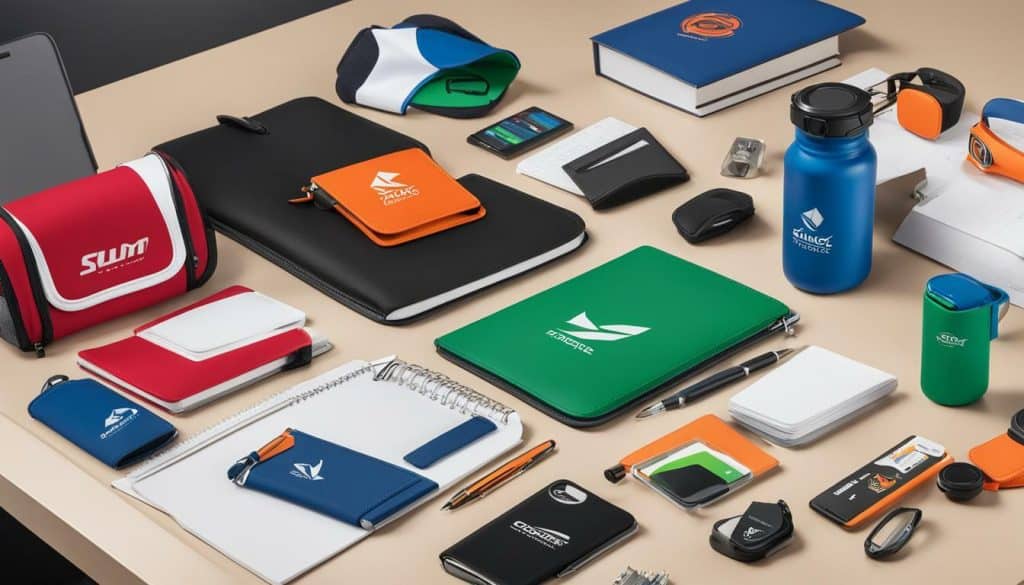
“Receiving personalized swag after a corporate event made me feel appreciated and valued. It was a meaningful gesture that left a lasting impression, and it reinforced the positive experience I had at the event. I continue to use the swag, which serves as a reminder of the event and the connections I made.” – Jane Doe, Event Attendee
Crafting Memorable Follow-up Emails
Creating impactful follow-up emails is crucial for making a lasting impression and potentially advancing relationships with potential clients, partners, or collaborators. After a corporate event, it is essential to capitalize on the connections made and continue the conversation with personalized and engaging email communication.
When crafting follow-up emails, it is important to have a clear purpose and objective in mind. Whether it’s expressing gratitude, discussing potential collaborations, or arranging further meetings, your email should convey your intentions concisely and effectively.
Start by addressing the recipient by name and reminding them of your interaction at the event. This personal touch shows that you value the connection and have taken the time to remember them specifically. Keep the body of the email brief and to the point, focusing on the key highlights of your conversation and the value you can bring to their business.
To make your email stand out, consider incorporating a compelling call to action that encourages the recipient to take the next step. This could include providing additional resources, scheduling a follow-up call, or inviting them to attend future events or webinars. Including a relevant and eye-catching image can also help grab attention and reinforce your message.
Remember, timing is crucial when it comes to follow-up emails. Send your message promptly, preferably within 24-48 hours after the event, while the interaction is still fresh in the recipient’s mind. Additionally, be respectful of their time and avoid pestering with excessive follow-ups. If you don’t receive a response after a reasonable amount of time, it is acceptable to send a gentle reminder, but be mindful not to appear pushy.
By crafting personalized and impactful follow-up emails, you can leave a lasting impression and continue to build relationships with potential clients, partners, or collaborators. Use these emails as an opportunity to showcase your professionalism, expertise, and genuine interest in their business.
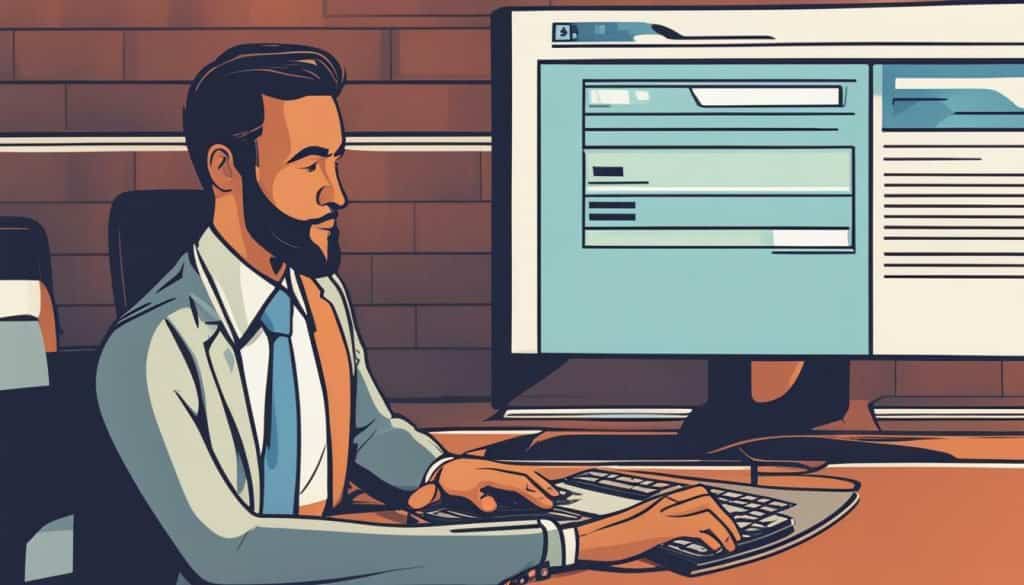
Conducting follow-ups after corporate events in South Africa is a vital component for fostering relationships, maximizing event success, and driving future business opportunities. By implementing effective event follow-up strategies, you can enhance your business network and ensure continued growth in the corporate event landscape.
One of the first steps in post-event follow-up is expressing gratitude to everyone involved. Personalized thank yous, whether in the form of individual cards or emails, leave a lasting impression and show your appreciation to guests, speakers, sponsors, vendors, and the core team and volunteers.
Evaluating the success of your event is crucial for continuous improvement. Hosting a post-event review or debrief session with your team and volunteers allows you to gather valuable insights and identify areas of strength and opportunities for growth. This process helps in planning future events more effectively and ensures that each subsequent event is better than the last.
Collecting feedback from attendees, sponsors, and speakers is another important aspect of event follow-up. Utilize surveys, informal conversations, and feedback forms to gather valuable insights that can inform your future event planning decisions. By understanding what worked well and areas that need improvement, you can tailor your events to meet the needs and expectations of your audience.
Engaging on social media is a powerful tool to maximize event exposure and build an audience for future events. Follow event-related conversations, express your gratitude to guests for their participation, and share event highlights to generate buzz and excitement. By actively engaging on social media platforms, you can strengthen relationships with attendees and keep your brand at the forefront of their minds.
Collecting visual media, such as event photos and videos, allows you to showcase the best moments of your corporate event and create marketing materials that promote future events. These visuals serve as powerful tools to engage potential attendees and highlight the success of your past events.
Show appreciation to your team, volunteers, and service providers by hosting an after-party. It provides an opportunity to celebrate the success of the event and strengthen relationships in a more relaxed environment. Additionally, consider sending out personalized swag or relevant items to key individuals involved in the event. This gesture reinforces your brand messaging and leaves a lasting impression.
Finally, crafting memorable and personalized follow-up emails is crucial for continuing the conversation with potential clients, partners, or collaborators. These emails should have a clear purpose, be concise and straightforward, and include a compelling call to action. Don’t hesitate to follow up again if no response is received, but be mindful of not contacting too frequently or soon.
By implementing these event follow-up strategies, you can foster relationships, maximize event success, and create future business opportunities in the dynamic landscape of corporate events in South Africa.
FAQ
Q: Why is conducting follow-ups after corporate events important?
A: Conducting follow-ups after corporate events is essential for maintaining relationships and gathering valuable feedback.
Q: Who should I thank after a corporate event?
A: It is important to thank everyone involved, including guests, speakers, sponsors, vendors, and the core team and volunteers.
Q: How can I leave a lasting impression after a corporate event?
A: Personalized thank yous, such as individual cards or emails, leave a lasting impression.
Q: What should I do to evaluate the success of a corporate event?
A: Hosting a post-event review or debrief session with the team and volunteers is valuable for evaluating the success of the event and gathering ideas for improvement.
Q: How can I collect feedback from attendees, sponsors, and speakers?
A: Collecting feedback from attendees, sponsors, and speakers can be done through surveys or informal conversations.
Q: How can I engage on social media after a corporate event?
A: Engaging on social media by following event-related conversations, thanking guests, and sharing highlights helps create buzz and build an audience for future events.
Q: How can I collect visual media from the corporate event?
A: Collect visual media, such as photos and videos, during the event to create marketing materials and highlight reels showcasing the event’s best moments.
Q: Should I host an after-party after a corporate event?
A: Hosting an after-party is a great way to show appreciation for the team, volunteers, and service providers.
Q: How can I strengthen relationships after a corporate event?
A: Sending out swag or personalized items that are relevant and useful can strengthen relationships and reinforce brand messaging.
Q: What should I consider when crafting follow-up emails after a corporate event?
A: Craft memorable and personalized follow-up emails with a clear purpose, be brief and simple, and end with a compelling call to action.
Q: How can I enhance my business network through post-event engagement?
A: Applying effective event follow-up strategies, such as personalized thank-yous, feedback collection, and post-event engagement, is essential for building and strengthening relationships in the corporate event landscape.
What Are the Essential Steps for Organizing a Successful Virtual Corporate Event?
Virtual corporate events have become increasingly popular in recent times. Organizing virtual corporate events requires careful planning and execution. Firstly, set clear objectives for the event and determine the target audience. Next, choose a reliable platform that offers features like live streaming, interaction, and analytics. Create engaging content, including presentations, videos, and interactive activities. Additionally, promote the event through various channels to maximize attendance. Finally, ensure seamless technical support to enhance the overall experience. Overall, organizing virtual corporate events demands strategic planning and attention to detail to guarantee a successful and impactful event.

